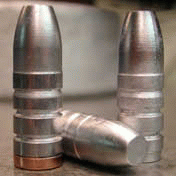

 The Accurate Reloading Forums
The Accurate Reloading Forums  THE ACCURATE RELOADING.COM FORUMS
THE ACCURATE RELOADING.COM FORUMS  Guns, Politics, Gunsmithing & Reloading
Guns, Politics, Gunsmithing & Reloading  Cast Bullets
Cast Bullets  Re: Hardening cast bullets
Re: Hardening cast bulletsGo  | New  | Find  | Notify  | Tools  | Reply  |  |
one of us |
| ||
|
| one of us |
According to Theantimonyman, A temperature of 464F( or higher if tin is present) dissolves the antimony. When quenched a fine precipitate of antimony occurs.24-36 hours for significant hardness to occur ,up to 72 hours for max hardness. In time hardness will slowly drop. The quenching produces precipitation, do not confuse this with typical hardening of steel where quenching produces a different crystal structure -martensite. | |||
|
one of us |
Quenching them right out of the mould is often done, and works well. If the bullets have cooled in the mould much below the melting point, though, some of the antimony has already started crystallizing out and won't remain in the "solid solution" until quenched. Trapping the dispersed antimony in "solid solution" at a low temperature where antimony is insoluble in lead is what causes it to precipitate out in the extremely fine crystals that make the alloy very hard, instead of the coarser crystals that form when the alloy's hot and the atoms can move freely through the lead matrix. The oven heating is just a way of getting the bullets uniformly to a barely solid temperature where the antimony's uniformly dissolved before suddenly quenching. Dropping them out of the mould is a lot less trouble. I try to cut the sprue as soon as it's solid enough and drop them straight into water. If you want to do it in the oven, take some expendable bullets and put them in the oven. Heat them up and watch them. Somewhere in the 450 degree F range or a little above, they'll start to slump. Turn the oven down 10 degrees and there's your curing temperature. Bake your bullets there for an hour. If they all slump, you got it just a little too hot. Melt 'em down and start over. When they're done, pull the pan out of the oven and instantly drop 'em all in a bucket of water, right there by the oven door. (It'll make a big whoosh of steam and splatter droplets of hot water.) Don't let 'em cool significantly before they hit the water, or you'll lose some hardness just as you do with casting and dropping them from the mould. The quenching has to be very rapid. I'm sticking with the water-drop casting. They get plenty hard that way. I doubt any commercial slugs are water-quenched. Didja read that "Key To Metals" article? Very interesting! | |||
|
| <ironbender> |
Ricochet- Thanks for taking the time to give explanations. The "Key To Metals" article looks good. I have it bookmarked but have not read it yet...I'm busy here at work  --Mike | ||
|
one of us |
You're welcome, Mike! John | |||
|
| Powered by Social Strata |
| Please Wait. Your request is being processed... |
|

Visit our on-line store for AR Memorabilia

